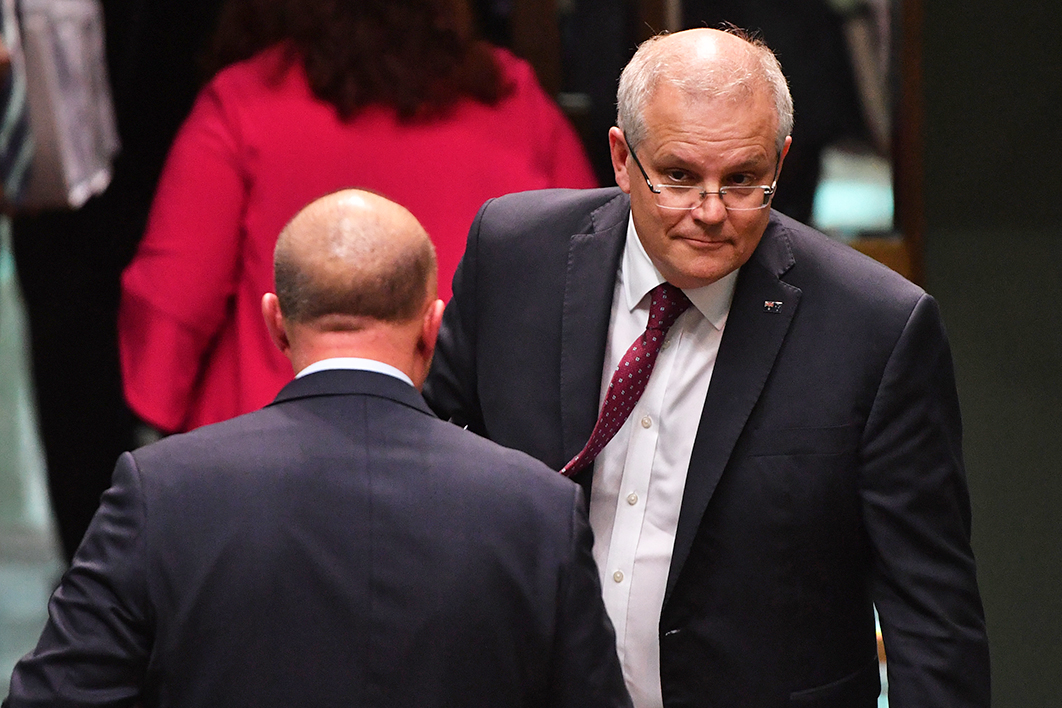In March 2016, six months after Malcolm Turnbull snatched the prime ministership from Tony Abbott, Turnbull ally Arthur Sinodinos was unwise enough to utter in public words that should only have been heard behind closed doors. An election was due later in the year.
Speaking to Barrie Cassidy on the ABC’s Insiders, Sinodinos ventured that “a returned government with Malcolm Turnbull at its head… will have the capacity to stamp its authority on all sorts of issues and I think people in the party will respect that.”
Cassidy: “So he’ll have a stronger mandate?”
Sinodinos: “I believe so.”
Conservatives in the party room and the wider movement interpreted this as a prediction that their time in the sun, facilitated by Tony Abbott’s seven-year leadership from late 2009, was coming to an end. They didn’t react well.
Which “issues” did Arthur have in mind? Well, anything that Turnbull had been forced to forswear to get that party-room majority. The most obvious was serious action on climate change, but the list possibly included a free vote on same-sex marriage, and more generally a government like the one across the ditch led by his mentor John Key: moderate, sensible centre-right, the kind they usually get in New South Wales.
Four months later the Coalition was returned to government, but only just. In fact, a hung parliament looked likely on election night, and friendly fire, including calls for his head, began pounding Turnbull. He never recovered.
What are the ingredients of a leader’s authority within a party? Election runs on the board — the perception of electoral indispensability or at least prowess — must rank one, two and three. Recall Malcolm Fraser after his two massive wins in 1975 and 1977; Bob Hawke for his first few, and Paul Keating after the 1993 election, which most had expected Labor to lose. Or John Howard for a year or so after taking office in 1996, before he lost his mojo for a few years; and then again from November 2001, re-elected after appearing a lost cause, and remaining The Man right through to his demise six years later.
Kevin Rudd enjoyed the elixir over 2008 and 2009, while Julia Gillard’s 2010 honeymoon lasted just a few weeks. Tony Abbott reached something approaching colossus status for about a year after his big 2013 victory.
There’s more to job security than that, of course; the smart leaders also massage backbenchers, keeping the troops happy, something Rudd found beneath him. But when your party room believes only you could have brought it into office, or kept it there, that silences the doubters and keeps opponents in their boxes.
On 18 May last year, Scott Morrison pulled a reverse Turnbull, turning an anticipated loss into a glorious re-election. It doesn’t get any better than that: it’s 1993 all over again.
And until very late last year, Morrison was king among Coalition MPs. Is it unfair to suggest he never invested that capital, never tried to drag the government out of its comfort zone? Constitutional recognition of Indigenous Australians could be an exception: he has been more open-minded than his ill-tempered predecessor, but that’s a very low base.
But on that perennial Coalition ideological tic, climate policy, he hasn’t even tried. Turnbull at least continued to push. Maybe Morrison is not personally inclined and has been happy to kick the can down the road. Or perhaps he underestimated his own strength and reckoned that a holding pattern — rather than relapsing into Abbott-era wink-wink denialism — was itself an achievement. And maybe it wasn’t an underestimation, and he was right.
Still, if he had given his joint party room a serious talking to, and forced his MPs to do more, the summer’s fire catastrophe would have provided a measure of personal vindication.
As it is, after a brief Christmas hiatus from muscular scepticism, with even deputy prime minister Michael McCormack conceding “absolutely” that more must be done to tackle climate change, the monster is back. Nationals sceptics are out again and proud, demanding that more, not less, coal must be set ablaze. The new resources minister has rolled out the chestnut that he accepts the science but “the climate has always changed,” as if that’s supposed to provide comfort.
Barnaby Joyce, commencing the standard two-round demolition of his leader, is barely bothering to hide plans to finish him off, rolling his eyes at McCormack in parliament.
It’s no surprise that the rebellion inside the junior party coincides with Morrison’s much-diminished stature. The terrible summer created the environment — though, irony of ironies, it threatens to drag the government further to the right on climate change.
So here we go again? Another shrivelled prime ministership, the latest in the eleven-year series since the onset of the global financial crisis? Is it just a matter of time before Peter Dutton strikes again (and the party baulks at him again and chooses a compromise candidate)?
Morrison will always have 18 May 2019, and the “he knows how to win an election” meme will keep him secure. But only up to a point. Nothing is certain — except that he’s wasted his opportunity to put his stamp on the government. •





